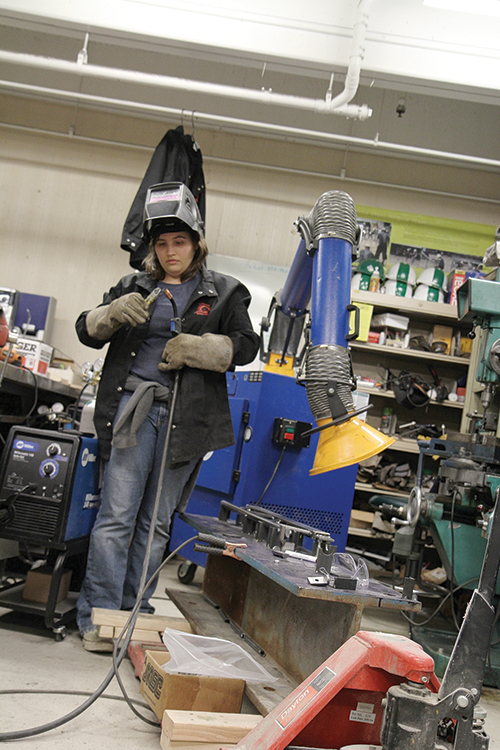This spring, Portland State’s engineering students will be participating in several much-anticipated activities, as student groups have been working all year for upcoming competitions and events.
Engineering students rally around upcoming competitions

This spring, Portland State’s engineering students will be participating in several much-anticipated activities, as student groups have been working all year for upcoming competitions and events.
For some, spring is the time of year that engineering students demonstrate what they have been working on since fall.
For others, it’s a time to get involved in engineering organizations.
Morgan Andrews, a sophomore studying civil engineering, got involved with the Portland State Student Chapter of the American Society of Civil Engineers at the beginning of this year because it was a great way to meet people in the program with similar interests.
“It’s been a really good place to make friends and…get to know the faculty,” Andrews said.
Rebekah Huschka, a civil engineering senior, said that ASCE helps students see what they’re actually going to be doing when they get out of school.
“ASCE has several lunch-and-learns, where a professional comes in and kind of says, ‘Hey, here’s what we’re doing,’” Huschka said.
In PSU’s Maseeh College of Engineering and Computer Science, most majors have specific student groups directed toward their field of study. For civil engineering, the biggest student group is ASCE.
One of the biggest events ASCE participates in is the student conference competitions that are held each year. This year, PSU will participate in both the steel bridge and concrete canoe competitions.
PSU is part of the Pacific Northwest Conference, which will be held at Oregon State University April 25–27.
Last year, PSU’s steel bridge teams came in first place at the regional conference and went on to the national competition. For the competition, students are required to design and build a steel bridge, and are scored in various categories: weight, assembly speed, efficiency and economy. The team placed 13th at the national convention.
“[The steel bridge] is kind of an all-year project,” Huschka said. “We start designing in the fall, then we fabricate the parts, then put the parts together in competition, and we’re timed on that.” The team has to meet certain size and weight requirements, and must make sure there is no bending in the bridge as the weight is loaded.
Huschka enjoys working on the steel bridge team because it’s a way to apply what she’s learning in her classes.
“[The] steel bridge is sort of a fun thing you can do with the knowledge you’ve learned. It’s applying what you have and doing it in competition,” Huschka said.
PSU has an entirely new team for the concrete canoe competition this year. No one has worked on a concrete canoe in the past, so all are learning together. The idea of a concrete canoe sounds ridiculous to many, but for these students, it’s about finding the right materials to use. The design of the concrete mix is the most important factor in the canoe’s success—many canoes end up sinking.
Andrews, who is part of the concrete canoe team, said that even though the team members are all new, they’ve made significant progress. They’ve stayed on schedule and are planning to pour the concrete this weekend. Last year, the team wasn’t at that stage until about five days before the competition, compared to almost a month this year.
“The team is almost all freshmen and sophomores, and we’ve really come together and worked really hard on it, so I think it should be great. I don’t know if we’re going to place, but I think it will be fun,”
Andrews said.
For Andrews, a great part of ASCE and the concrete canoe competition is getting to know faculty members outside of class. Evan Kristof, a professor in the engineering department, is the faculty advisor for the concrete canoe, and Andrews said she has enjoyed getting to know him on a more personal level.
“I’ve been using him as a reference for job applications and he’s really willing to work with us. It’s a good place to network,” Andrews said.
Huschka and Andrews are just two of many students who are part of the PSU student chapter of ASCE. On a national level, ASCE is a professional society and one of the oldest national engineering groups, founded in 1852. The PSU student chapter is extremely involved all year; holding events like the lunch-and-learns, general meetings and various other get-togethers, ASCE is growing fast.
Next year, PSU will host the regional conference for the first time, and is already in the early stages of planning the event. Universities from all over the Pacific Northwest will come to PSU to participate in the events and see what the department has to offer.
Another student group at PSU is the Society of Women Engineers. Like ASCE, SWE holds many events throughout the year and is a great professional society for students to get involved in. This coming weekend, April 5–7, a group of SWE members will travel to Olympia, Wash., for the Region J Conference. The conference consists of workshops, speeches and networking opportunities for students and professionals to participate in throughout the weekend. A career fair will also be held.
Oregon MESA is a program that PSU helps support. MESA, which stands for Mathematics, Engineering, Science Achievement, is a group that works with underrepresented middle and high schools to help promote engineering in the schools. MESA Day, which will take place on May 10 in the Smith Memorial Student Union ballroom, will include a main competition as well as on-site competitions.
Throughout the year, participating schools have been holding weekly after-school meetings to work on their pieces for the competition. This year, teams will create prosthetic arms and compete against other local schools. Since only one team can compete at a time, other activities will be held throughout the day, and ASCE and other groups will be leading those projects.




